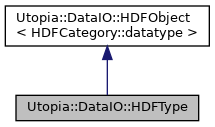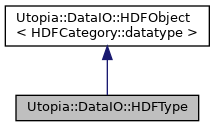Class which handles the conversion of C-types into hdf5types. More...
#include <hdftype.hh>


Public Types | |
| using | Base = HDFObject< HDFCategory::datatype > |
| using | Variant = std::variant< float, double, long double, int, short int, long int, long long int, unsigned int, unsigned short int, std::size_t, unsigned long long, bool, char, std::vector< float >, std::vector< double >, std::vector< long double >, std::vector< int >, std::vector< short int >, std::vector< long int >, std::vector< long long int >, std::vector< unsigned int >, std::vector< unsigned short int >, std::vector< std::size_t >, std::vector< unsigned long long >, std::vector< char >, std::vector< std::string >, std::string, const char * > |
Public Member Functions | |
| bool | is_mutable () const |
| Get if the type is mutable or not. More... | |
| auto | type_category () const |
| Get the type category of the held type, i.e., scala, string, varlen,... More... | |
| std::size_t | size () const |
| Size of the type held in bytes. More... | |
| template<typename T > | |
| void | open (T &&object) |
| Open the HDF5 type associated with an HDFObject, i.e., a dataset or an attribute. More... | |
| template<typename T > | |
| void | open (std::string name, hsize_t typesize) |
| Create an HDF datatype corresponding to the C datatype given as template argument. More... | |
| void | close () |
| Construct close from the given arguments. More... | |
| virtual bool | is_valid () const override |
| Check if the held type identifier is still valid. Primitive types are valid by definition, because we have no control over them and hence they cannot be invalidated. More... | |
| HDFType (HDFType &&other) | |
| Construct HDFType from the given arguments by move, deleted, because apparently incompatible with HDF5 C backend. More... | |
| HDFType & | operator= (HDFType &&other) |
| Move assign the type. More... | |
| HDFType (const HDFType &other)=default | |
| Construct HDFType from the given arguments by copy. More... | |
| HDFType & | operator= (const HDFType &other)=default |
| Copy assign type. More... | |
| virtual | ~HDFType () |
| Destroy the HDFType object. More... | |
| HDFType () | |
| Construct HDFType from by default. More... | |
| template<typename T > | |
| HDFType (T &&object_or_size, std::enable_if_t< not std::is_same_v< HDFType, std::decay_t< T > >, int >=0) | |
| Construct HDFType from the given arguments. More... | |
 Public Member Functions inherited from Utopia::DataIO::HDFObject< HDFCategory::datatype > Public Member Functions inherited from Utopia::DataIO::HDFObject< HDFCategory::datatype > | |
| void | swap (HDFObject &other) |
| swap the state of the caller with the state of the argument More... | |
| std::string | get_path () const |
| Get the name or path object. More... | |
| auto | get_id_object () const |
| Get the id object. More... | |
| auto | get_logger () const |
| Get the logger object. More... | |
| hid_t | get_C_id () const |
| Get the C id object. More... | |
| auto | get_refcount () |
| Get the reference count of object. More... | |
| void | close () |
| Close function which takes care of correctly closing the object and managing the reference counter. More... | |
| void | bind_to (hid_t id, std::function< herr_t(hid_t) > closing_func, std::string path={}) |
| Open the object and bind it to a HDF5 object identified by 'id' with name 'path'. Object should be created beforehand. More... | |
| HDFObject () | |
| Construct HDFObject from the given arguments. More... | |
| HDFObject (HDFObject &&other) | |
| Construct HDFObject by moving. More... | |
| HDFObject (const HDFObject &other)=default | |
| Construct HDFObject by copying another object. More... | |
| HDFObject (hid_t id, std::function< herr_t(hid_t) > closing_func, std::string path={}) | |
| Construct HDFObject from the given argument. More... | |
| HDFObject & | operator= (const HDFObject &other) |
| Copy assignment operator. More... | |
| HDFObject & | operator= (HDFObject &&other) |
| move assignment operator More... | |
| virtual | ~HDFObject () |
| Destroy the HDFObject object. Has to be implemented in subclass! More... | |
Private Attributes | |
| bool | _mutable = false |
| H5T_class_t | _classid |
Additional Inherited Members | |
 Static Public Attributes inherited from Utopia::DataIO::HDFObject< HDFCategory::datatype > Static Public Attributes inherited from Utopia::DataIO::HDFObject< HDFCategory::datatype > | |
| static constexpr HDFCategory | category |
| Named variable for template arg. More... | |
 Protected Attributes inherited from Utopia::DataIO::HDFObject< HDFCategory::datatype > Protected Attributes inherited from Utopia::DataIO::HDFObject< HDFCategory::datatype > | |
| HDFIdentifier | _id |
| Identifier object that binds an instance of this class to an HDF5 object. More... | |
| std::string | _path |
| Name of the object. More... | |
| std::shared_ptr< spdlog::logger > | _log |
| pointer to the logger for dataio More... | |
Detailed Description
Class which handles the conversion of C-types into hdf5types.
Member Typedef Documentation
◆ Base
◆ Variant
| using Utopia::DataIO::HDFType::Variant = std::variant< float, double, long double, int, short int, long int, long long int, unsigned int, unsigned short int, std::size_t, unsigned long long, bool, char, std::vector< float >, std::vector< double >, std::vector< long double >, std::vector< int >, std::vector< short int >, std::vector< long int >, std::vector< long long int >, std::vector< unsigned int >, std::vector< unsigned short int >, std::vector< std::size_t >, std::vector< unsigned long long >, std::vector< char >, std::vector< std::string >, std::string, const char* > |
Constructor & Destructor Documentation
◆ HDFType() [1/4]
|
inline |
Construct HDFType from the given arguments by move, deleted, because apparently incompatible with HDF5 C backend.
◆ HDFType() [2/4]
|
default |
Construct HDFType from the given arguments by copy.
◆ ~HDFType()
|
inlinevirtual |
Destroy the HDFType object.
◆ HDFType() [3/4]
|
inline |
Construct HDFType from by default.
◆ HDFType() [4/4]
|
inline |
Construct HDFType from the given arguments.
- Parameters
-
size Size of the type underlying the type to be created, or an HDFdataset or attribute to determine the held datatype of
Member Function Documentation
◆ close()
|
inline |
Construct close from the given arguments.
◆ is_mutable()
|
inline |
Get if the type is mutable or not.
- Returns
- true
- false
◆ is_valid()
|
inlineoverridevirtual |
Check if the held type identifier is still valid. Primitive types are valid by definition, because we have no control over them and hence they cannot be invalidated.
- Returns
- true
- false
Reimplemented from Utopia::DataIO::HDFObject< HDFCategory::datatype >.
◆ open() [1/2]
|
inline |
Create an HDF datatype corresponding to the C datatype given as template argument.
- Template Parameters
-
T
- Parameters
-
object_or_size size of the datatype in bytes, if not given, automatically determined: containers and strings become variable length size, everything else becomes scalar
◆ open() [2/2]
|
inline |
Open the HDF5 type associated with an HDFObject, i.e., a dataset or an attribute.
- Template Parameters
-
T
- Parameters
-
object
◆ operator=() [1/2]
Copy assign type.
- Returns
- HDFType&
◆ operator=() [2/2]
Move assign the type.
- Returns
- HDFType&
◆ size()
|
inline |
Size of the type held in bytes.
- Returns
- std::size_t
◆ type_category()
|
inline |
Get the type category of the held type, i.e., scala, string, varlen,...
- Returns
- auto type category of held type
Member Data Documentation
◆ _classid
|
private |
◆ _mutable
|
private |
The documentation for this class was generated from the following file:
- include/utopia/data_io/hdftype.hh